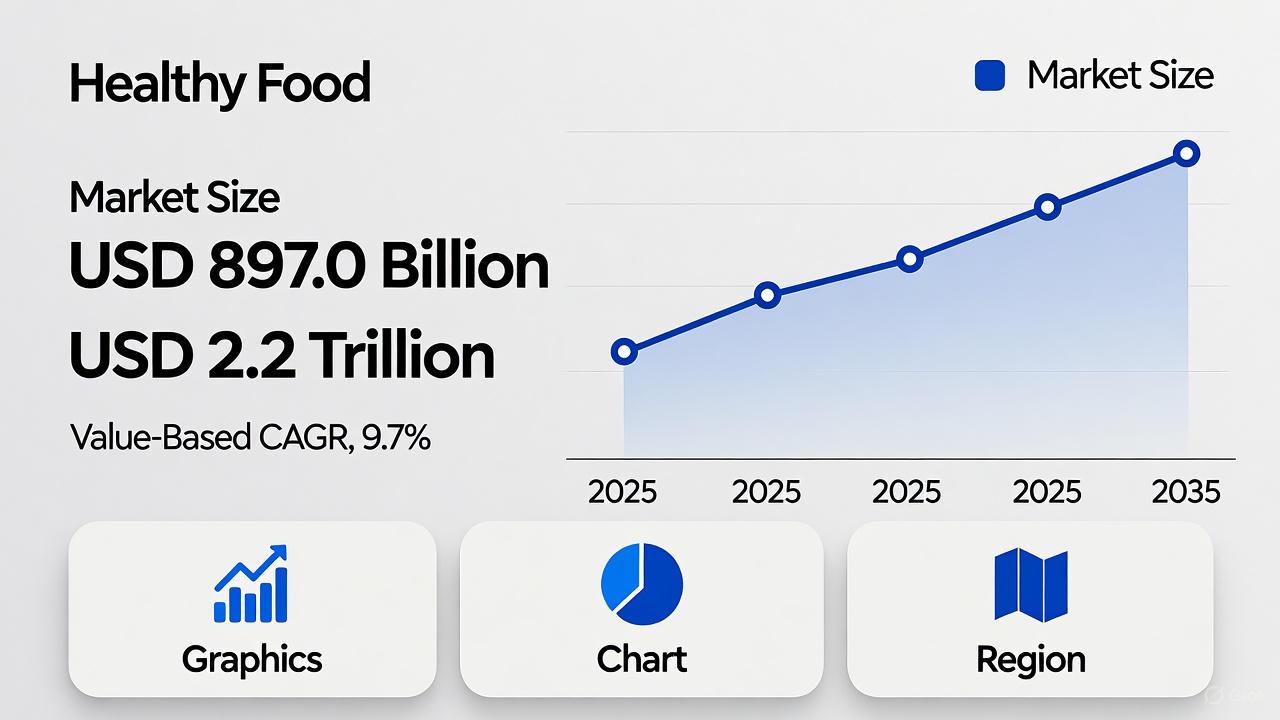Healthy Food Market to Surpass USD 2.2 Trillion by 2035

The global Healthy Food Market is projected to reach USD 897.0 billion by 2025 and is forecasted to grow at a CAGR of 9.7%, hitting USD 2.2 trillion by 2035. This growth reflects an accelerating global shift toward nutrition-driven food choices, transparency in ingredients, and sustainable consumption practices. The industry is undergoing a transformation where both established players and emerging startups are innovating to meet evolving consumer needs for wholesome, functional, and ethically sourced food options.
Changing Consumer Preferences and Market Drivers
A heightened understanding of the link between diet and chronic diseases such as obesity, diabetes, and heart conditions has reshaped eating habits worldwide. Consumers are now prioritizing healthier alternatives, supported by government campaigns promoting balanced diets. Millennials, fitness enthusiasts, and aging populations are emerging as dominant consumer groups, influencing the direction of product innovation and marketing strategies.
Modern consumers demand transparency, driving the rise of clean-label and organic food products. They prefer foods free from artificial ingredients, preservatives, and genetically modified organisms. This change in perception has accelerated the demand for plant-based and minimally processed foods, transforming the global food landscape.
The growing popularity of vegan and flexitarian diets further amplifies this trend. Products such as plant-based meats, dairy alternatives, and functional foods fortified with vitamins, probiotics, and minerals are gaining prominence, appealing to both health-conscious and environmentally aware buyers.
Technology and E-Commerce Powering Market Growth
Technological advancements have allowed manufacturers to develop nutrient-rich food without compromising taste or convenience. Innovations in bioengineering, fermentation, and natural fortification are helping brands deliver healthier choices efficiently.
Meanwhile, the rise of e-commerce and direct-to-consumer channels has revolutionized the availability and distribution of healthy food products. Subscription models and online health-focused marketplaces have increased global access, making healthy eating more convenient than ever before.
Challenges in the Market Landscape
Despite robust growth, the healthy food market faces significant challenges. The higher price of organic and specialty foods limits accessibility for price-sensitive consumers. Additionally, products often have a shorter shelf life, posing logistical challenges for retailers.
Regulatory hurdles related to certification, labeling, and compliance remain a barrier, particularly for small and medium-sized enterprises (SMEs) attempting to enter developed markets. Moreover, some consumers express skepticism regarding “organic” and “natural” claims, underlining the need for greater standardization and trust-building within the industry.
Emerging Opportunities and Regional Insights
Emerging economies in Asia-Pacific and Latin America present vast untapped potential, driven by urbanization, rising disposable incomes, and increasing health consciousness. Innovations in personalized nutrition powered by artificial intelligence and data analytics are also reshaping the sector, allowing brands to tailor offerings to individual health profiles.
Countries like the United States, the United Kingdom, Germany, India, and Japan are key contributors to market expansion. In the U.S., the demand for organic and non-GMO products continues to surge, while Germany leads Europe’s organic food market. India’s growing middle class and Japan’s aging population are fueling demand for nutrient-dense and functional food options.
Get this Report at $3500 Only (Report price) | Exclusive Discount Inside!: https://www.futuremarketinsights.com/reports/sample/rep-gb-19958
Competitive Landscape: Collaboration and Expansion
The competitive ecosystem is a blend of global food giants and innovative startups. Major corporations such as Nestlé, Danone, Kellogg’s, Unilever, PepsiCo, and General Mills are actively expanding their healthy food portfolios through acquisitions and reformulations.
PepsiCo’s acquisition of Siete Foods for USD 1.2 billion highlights a growing corporate focus on nutritious, grain-free snacks. Simultaneously, startups like Beyond Meat, Impossible Foods, Allplants, Veganz, and Nature & Moi are disrupting the market with sustainable and plant-based alternatives. These emerging brands are attracting a loyal customer base seeking cleaner, greener, and more transparent food options.
- Art
- Causes
- Crafts
- Dance
- Drinks
- Film
- Fitness
- Food
- Juegos
- Gardening
- Health
- Inicio
- Literature
- Music
- Networking
- Otro
- Party
- Religion
- Shopping
- Sports
- Theater
- Wellness


